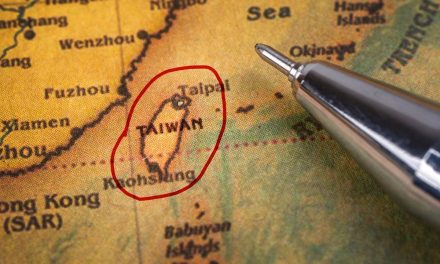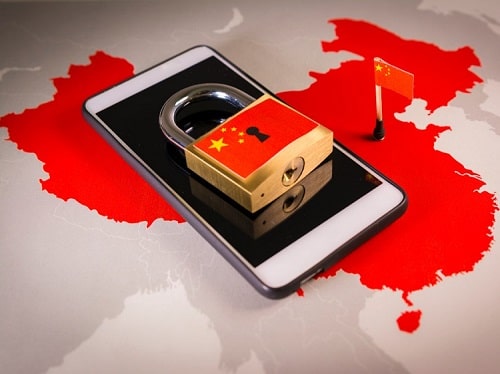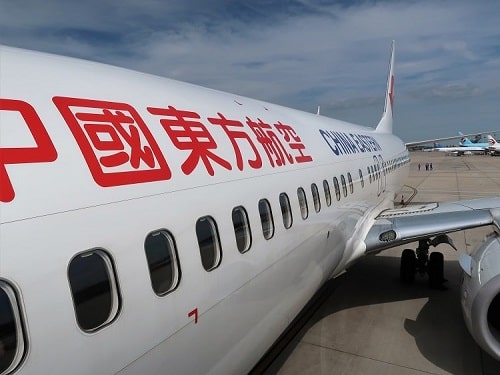When you move to China, there are some things you ought to know.
But most of the time, no one tells you. You find out once you get there.
So, to save you from a hard landing, here are 18 nuggets of wisdom.
Hopefully they will help with your move to China.
(And, apologies in advance if this article comes off as a bit pessimistic. I bloody love China!)
1. You need to have money

You need a few bucks in your back pocket before heading to China. Image by Steve Buissinne on Pixabay.
Moving to China, or anywhere abroad, is expensive. Every little thing adds up.
But the concept of moving overseas is so exciting that you often overlook the huge, growing dent in your bank account.
Here are some of my major expenses for China:
- Packing and storing
- Flights
- Work visa (and all the documents and tests you need to get to the visa stage)
- GoPro and hard drive
- New clothes and shoes (sizes are tiny in China)
- Suitcase and backpack
- 6 weeks’ of living expenses while waiting to get paid.
All up, I estimate this to be about US$3,000 just for one person, not to mention lost earnings between leaving my job in Australia and starting work in China.
Before I left home, I even sold my car to top up my drained bank account!
I don’t want to think how I’m going to get around when I return home.
Oh, and you’ll probably need more than $3,000 if your employer isn’t paying for housing. Upfront rental fees can sting hard in expensive cities like Shanghai and Shenzhen.
Factor in another $2,000 or so, depending on your expected rental deposit.
As you can see, whether you’re moving to China from the UK, America, Canada or somewhere else, you’ll need to be cashed up.
2. You’ll live like a king or queen

You can live very comfortably in China. Image by Rondell Melling on Pixabay.
Once you’ve gotten over the initial cash hurdle, you’ll live a life of luxury in China.
OK, maybe that’s a slight exaggeration, but you will live a king or queen here.
Of course it depends on the salary package you’re on, but no sensible expat would live here if the salary was bad.
Particularly outside the biggest cities, the cost of living is a lot less than many other places around the world.
Flight allowances, accommodation expenses, private health insurance, bonuses, and meals are commonly offered to expat employees.
You’ll still need to pay tax, but overall your take-home pay will be very, very nice.
Not worrying about money is the best feeling ever.
See also: American expat tax in China
3. Everything is hard

We finally did it! Setting up a bank account calls for a Kodak Moment. Image supplied by Mike Cairnduff.
Things are hard, at least in the beginning until you get everything sorted.
For me, it took three visits and five hours to get a local bank account correctly set up.
The problem?
The bank entered my first name before my surname (which is the correct order in my country), but it should have matched the order in my passport.
Because of this, I couldn’t use WeChat Pay, which practically everyone uses in China to make payments.
It was so hard using cash for the first month while the problem was being fixed.
This is because the ATMs only spit out 100 yuan bills, yet the shops and street food vendors won’t accept large denominations.
So, you have to constantly find big supermarkets to get 10 and 20 yuan notes in order to eat.
It’s a major pain in the you-know-what.
This is just one example of how things can be hard in the first month.
See also: Counting money in Chinese
4. You can’t survive without WeChat

Even fishmongers prefer WeChat. Image by Freer on Shutterstock.
WeChat rules in China.
I remember being forced to download it at the airport as it was part of the health procedures.
I honestly don’t know how you could survive in China without WeChat. It’s for paying, it’s for communicating, it’s for transport, it’s for food…
I wish I’d downloaded the app and played around with it before getting to China. I was like a deer in the headlights the first time when trying to pay for something.
There are other China apps but WeChat reigns supreme.
5. The Chinese internet sucks

Accessing the web can be hard. Image by Karen Roach on Shutterstock.
Why can’t we just have one big, happy worldwide internet?
While virtual private networks (VPNs) in China are a saving grace, they often don’t work so you can’t do what you need to do.
Bing is a horrible alternative to Google, but it has to do in those ‘emergency’ situations.
I recommend signing up for numerous VPNs, so that when one is down you can use another.
Please check out my review of the best VPN for China or jump straight to the one that I’ve found to be the best here.
Whatever you do, make sure you download your VPN before you relocate to China. All the big VPN companies are blocked here.
Once you start to become a China pro and pay for stuff with WeChat Pay or Alipay, you’ll have to temporarily turn off your VPN each time, otherwise the payment won’t work.
The same goes for watching videos, sending attachments, and so on.
It’s a pain, but you’ll get used to it. Eventually.
(Speaking of sucky things, I’ve penned an entire article outlining the reasons why China sucks. OK, I may have written it while I was in a bad mood, but I still stand by it.)
6. Air pollution is bad outside the major cities
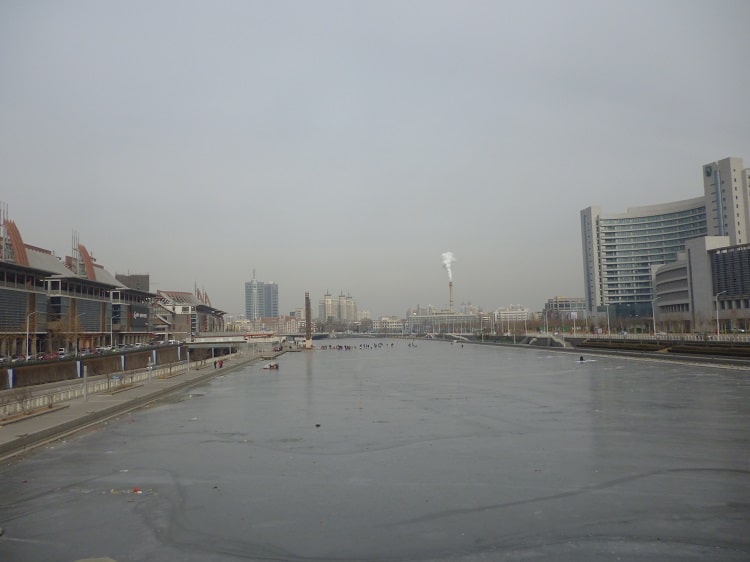
People with respiratory issues might be put off moving to China. Image supplied by Mike Cairnduff.
If I had a dollar for every time someone said “The air was fine on my trip to Beijing!” I’d be a rich man.
The truth is, factories and coal-fired power plants have been pushed to the cities that don’t see a lot of foreigners.
So, while there might be blue skies in the biggest cities, I can assure you the air quality elsewhere can be really, really bad on some days.
Where I am, in the northwest, it seems to be worse at night. I’ve had to stop my nightly walks because my lungs just couldn’t take it.
7. You’ll end up spitting

You constantly hear people clearing their throat. Image by Alex Segre on Shutterstock.
Lots of Chinese men spit (and smoke – but that’s another story).
I must admit I have done it too when no one is looking. Oops.
I think it’s a combination of “When in Rome, do as the Romans do”, as well as trying to relieve my throat from all the dust and pollution in the city I’m in.
If you end up relocating to China, consider investing in a good quality pollution mask. I need to take a leaf out of my own book – I’m yet to do this.
For more on spitting in China, take a read of the article titled Why do Chinese people spit?
8. Your logic will be flipped

Sometimes, you just have to go with it. Image by Adam Bobro on Pixabay.
In China, things will be baffle and confuse you.
But the Chinese logic isn’t wrong. It’s just very different to what you’re used to.
Chinese history and culture go back thousands of years, and I honestly believe we’ll never truly understand Chinese people 100% (and perhaps they’ll never truly understand other cultures, either).
But I think that’s OK. The most important thing is recognizing and appreciating our differences.
Every day, I’m learning more about China, and more about myself.
9. Mandarin takes ages to learn

Learning Chinese isn’t a walk in the park. Image by Pexels.
Have you seen those websites that guarantee foreign language fluency in three months?
I call B.S. on that.
I’ve been in China for a while now, and although my Mandarin has definitely improved, I feel that I still have such a long way to go.
They don’t call it the “dragon’s tongue” language for nothing!
It also doesn’t help that everywhere you go, the locals speak different dialects.
This makes it hard for the language to sink in because what you’re hearing in the background probably isn’t standard Mandarin.
Plus, many locals want to practise their English with you. While this is lovely, it makes it harder for you to get a grasp on learning basic Mandarin.
10. Phone plans are confusing

Get a local to help you with your phone plan. Image by Rafapress on Shutterstock.
I still don’t know when I’m meant to top up my phone with extra money.
My employer set up a phone plan for me before I’d even arrived. They apologized for the “bad phone number” they’d chosen.
See also: Chinese lucky numbers
To check your balance or top up, you’ll need to be able to navigate your China telco’s app or Mini Program (this is within WeChat).
You’d better get started learning Chinese characters!
And a reminder: when you move to China, make sure your phone is unlocked.
11. Men may leer at you

My friends have complained about guys staring at them. Image by Zay Nyi Nyi on Shutterstock.
This one is for the ladies.
If you wear tight-fitting or revealing clothes in China, the men may leer at you.
I recommend reading my guide on what to wear in China so you’re best prepared.
But even if you’re not wearing revealing clothing, if you move to a smaller city in China which sees few expats, you’re going to stand out like a sore thumb.
For an introvert like me, this is something that never gets easy.
12. Your tastebuds will go wild

Chinese snacks will excite you. Image supplied by Mike Cairnduff.
Chinese food is so damn good!
It’s nothing like the Chinese food you get back home, which has been adjusted for Western tastes.
My policy is I’ll try anything that’s offered to me.
The duck intestine was pretty gross, but apart from that I’ve had some amazing meals here.
Even Chinese snack food is good. So good that I decided to write a whole article about Chinese Lays flavors.
Yep, really.
13. You’ll probably put on weight
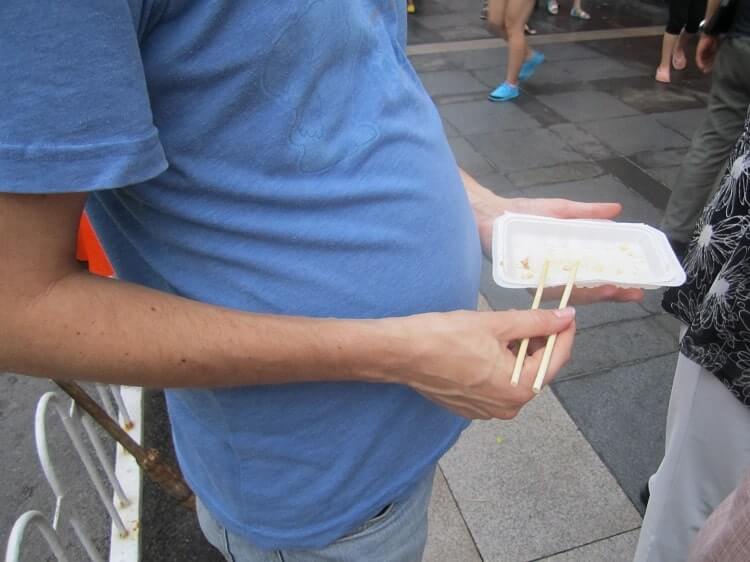
I can’t stop eating here. Image supplied by Mike Cairnduff.
With all the great food in China, you’re likely to put on weight. I have.
After every meal here, I crave sugar (and lots of it).
Eating two chocolate bars a day here is not unusual for me. And that’s on top of all the sweetened drinks I’m gulping down.
I don’t know if it’s the MSG, or the salt in the food, but if I don’t get a sugar hit after eating then I feel unbalanced.
I’ve now got a little pot belly.
14. You’ll have to compromise on quality

Chinese mattresses are rock hard (hard to tell in this photo). Image supplied by Mike Cairnduff.
Gee, I hope I don’t sound like an entitled middle-aged white guy with this one.
I just found that when I went looking for the necessary bits and pieces to furnish my apartment, the quality is way worse than back home. It was hard to find really nice things.
Towels, for instance, are small, thin and bad quality. You’ll need deep pockets if you want to buy plush towels in China.
I’m not in a huge city though, so maybe that has a lot to do with it.
Oh, and the beds in China. Wow.
Jokingly, back home I used to call my bed “the cloud” as it’s so soft. But Chinese beds couldn’t be any further from such softness.
I must say though, after a few first rough nights, my body has adjusted. I can proudly say I could probably have a good night’s sleep on a wooden floor if I wanted to.
15. Taxi drivers will rip you off

A good old green Chinese taxi in need of a wash. Image supplied by Mike Cairnduff.
Every time I come to China, I get ripped off by taxi drivers.
I really need to start using Didi!
I just find it easier to jump in a taxi at the airport or high-speed train station because the taxi rank is usually so easy to find and you don’t have to fiddle with your phone.
At least once in every five rides here, the driver doesn’t turn on the meter.
And every time – no joke – I forget to check until I’m almost at my destination!
I think I get too excited, too distracted (I like to practice my Chinese with the driver), or maybe I’m just more forgetful with older age.
I don’t know about you, but I hate the feeling of getting swindled – especially when I’ve just arrived in a foreign country.
Welcome to China.
16. Your bowels may never adjust

Hopefully you’ll get some sort of regularity, unlike me. Image supplied by Gayle Aggiss.
You’ve probably heard about Bali Belly.
Well, let me tell you about “Beijing Bowel”.
If you’re adventurous with food like I am, your bowels might take a long time to adjust to life in China.
Without going into too much detail, I can assure you it’s been hard to get into any normal rhythm or routine.
Ohhhh, and the toilets. The toilets…
I won’t bang on too much about this as there’s an entire article on The Helpful Panda about Chinese toilets. Plus, I’ve even written an FAQ on the squatty potty myself!
But if you can avoid using public toilets in China, then make sure you do.
Save your business for the sit-down throne in your apartment.
17. Toiletries are a luxury

Arrive with your favorites in hand. Image supplied by Mike Cairnduff.
Some of your everyday toiletries are deemed a bit of a luxury in China.
Things like deodorant, tampons, dental floss and sunscreen are not on your average Chinese person’s shopping list.
This is why I recommend bringing a stash of your own when you’re moving to China.
You’ll still be able to find the toiletries you need, you just can’t be fussy on the brand as there may only be one to choose from.
See also: Packing list for China
18. You can kiss good dairy goodbye

Mmmm, dairy. Image by Duane Retzlaff on Pixabay.
You can get some dairy food in China, but nothing like what I’m used to.
And, everything tastes different (i.e. worse). There’s barely any flavor.
Even Pizza Hut, which I love back home, isn’t great here. They seem to mix real mozzarella with a cheap and nasty cheese sauce, yet still charge Western prices.
I miss good cheese, good milk, good yoghurt, and good ice-cream.
I didn’t realize how much dairy was in my diet until I came to China!
Some final nuggets of wisdom
You’ll need your passport to stay at any accommodation, get into any tourist attraction, and to travel anywhere on the high-speed trains.
So, don’t go anywhere without your passport. Remembering to always carry it when you travel will eventually become second nature.
No matter how long you intend on staying in China, get decent health insurance. A comprehensive plan is best.
And last but not least, respect your new home and environment. You may not agree with everything, but you can at least try to understand things from a different perspective.
Good luck moving to China
I hope this article wasn’t too pessimistic for you.
I’ve just tried to highlight some of the pain points (and some positives) I’ve experienced, so you know what to expect when you move there.
Have an amazing time in China, and like I said before, don’t forget your VPNs! Ask me any questions in the area below.
Main image credit: Ferdinand Herndler on Pixabay.
Frequently asked questions about moving to China
Is moving to China a good idea?
Absolutely! It will change you and challenge you in so many ways. It will open up your mind even more, you’ll learn about a new culture and try amazing foods, you’ll make lifelong friends and have priceless memories forever.
Is it cheaper to live in China than the US?
Yes, it is. The cost of living in China is generally lower than in the US. Plus, most expats can earn a tidy salary. Just be careful if you’re living in one of the major cities (like Shanghai, Beijing, Guangzhou or Shenzhen) as they can be expensive, particularly if you buy Western goods. Try to eat and live like a local and you should be able to save money in China.
Should I move to China or Japan?
The countries are totally different in almost every aspect. For example, the Chinese are loud (the Japanese are quiet), China is still developing (Japan is developed), China is enormous which makes it amazing for travel (whereas Japan is more compact), and so on. It depends on the kind of experience you want to have.
Is it safe to move to China?
Yes. When it comes to your personal safety, China is one of the safest countries in the world to visit or live in. Gun crime is practically unheard of, and so to is sexual assault. However, no country is perfect, and civil liberties are different in China. Just follow the local laws and you should be fine.



